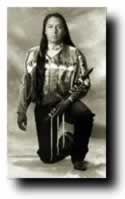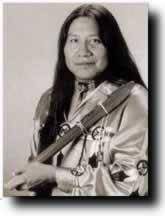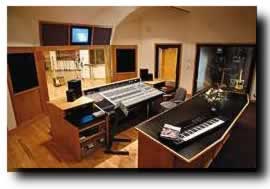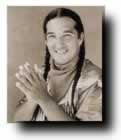![]()
![]()
 Makoché
Makoché
Peggy Randall interviews Cherie Harms and David Swenson, co-owners of the Makoché Recording Label, which specializes in Native American music; both traditional
and contemporary.Makoche releases received two GRAMMY nominations in 200, for Best Native American
Music Album category.
This is the first year the NARAS, National Association of Recording Arts & Sciences, have included a Best Native American Music Album category in the GRAMMY
awards.
Peggy Randall: What does the word, Makoché mean?
Cherie Harms: It's a derivative of the Lakota word "Maka" for earth. The land, all that is in it, and to expand on that the interdependency of all living things.
PR: When did you start the label?
CH: In October of '95 we bought a sound studio. Our first national street date was April 1st, 1996.
PR: Do you record anything other than Native?
CH: We have other labels that are under the Makoché Recording Company umbrella. Makoché is the most developed. The other one that is developing is Chairmaker's Rush. It's the name of a grass that is used to make chairs... Old time fiddling, traditional fiddling.
PR: Why did you go Native?
 David
Swenson: I've been involved in studio recording for over twenty years and in
the mid-eighties I met a flute player named Kevin Lockeand we struck up a friendship.
He had done a small amount of recording at a studio in Toronto and he was looking
for something closer to home. He lives in Mobridge, South Dakota. Kevin's a
member of the Standing Rock Lakota...Those recordings were picked up by EarthBeat!
And we had three tapes they turned into one CD callled Dreamcatcher which
did phenomonally well. So the idea for a label really came from Cherie. I was
involved in the studio. She came in on a management sense, and at that point
we didn't own a studio. It was her idea...I was immersed in it... She said we
could buy this studio and start a label. It just made sense. There is so much
talent centered in this part of the land.
David
Swenson: I've been involved in studio recording for over twenty years and in
the mid-eighties I met a flute player named Kevin Lockeand we struck up a friendship.
He had done a small amount of recording at a studio in Toronto and he was looking
for something closer to home. He lives in Mobridge, South Dakota. Kevin's a
member of the Standing Rock Lakota...Those recordings were picked up by EarthBeat!
And we had three tapes they turned into one CD callled Dreamcatcher which
did phenomonally well. So the idea for a label really came from Cherie. I was
involved in the studio. She came in on a management sense, and at that point
we didn't own a studio. It was her idea...I was immersed in it... She said we
could buy this studio and start a label. It just made sense. There is so much
talent centered in this part of the land.
Kevin told me a story about being at a seminar about how to write proposals to get grants. He listened to all these artists talk about how difficult it was out in the Midwest working, where there was no cultural influence and it was a wasteland. It is open and it can be tough. And he got up at the end of the meeting and said he didn't want to be disrepectful but for him this place was the center of everything. The Blackhills and the Heart, and he got the grant. If you take that story and you apply it to us. Cherie and I believe the same thing. I'm in the unique position to be able to translate this culture into a product and expose it to more people.
PR: Why do it?
 DS:This
is a very powerful culture. It is an extremely honest culture. It's a culture
that is close to the earth and knows right fromwrong. It's a culture that is
close to the earth and knows right from wrong -- hands out respect in huge amounts
to the right things. The white culture that I come from misses that. I have
a teenage son and I was talking to him this week about the things that are going
on. You look at what's going on in government and you look at what is going
on in TV. What an awkward time for kids? Where is the quality of respect amongst
people to give respect to life? I look to the Native culture and I see that
at its best there is respect for the land, for family, for human beings. And
that's what it should be. When I talk about the translation of this music, as
an expression of native culture, it's a way to share the values with a culture,
white culture, that can benefit from it. I really mean it.
DS:This
is a very powerful culture. It is an extremely honest culture. It's a culture
that is close to the earth and knows right fromwrong. It's a culture that is
close to the earth and knows right from wrong -- hands out respect in huge amounts
to the right things. The white culture that I come from misses that. I have
a teenage son and I was talking to him this week about the things that are going
on. You look at what's going on in government and you look at what is going
on in TV. What an awkward time for kids? Where is the quality of respect amongst
people to give respect to life? I look to the Native culture and I see that
at its best there is respect for the land, for family, for human beings. And
that's what it should be. When I talk about the translation of this music, as
an expression of native culture, it's a way to share the values with a culture,
white culture, that can benefit from it. I really mean it.
There are not a lot of rewards once you get into the record industry. Let's
keep money out of it, ...I mean money doesn't mean anything. But you get unique
special moments with artists, ...with people.
If Cherie and I were only in it
for the money we would have got out of it a long time ago. We are trying to
do something worthwhile that is going to outlast us -- that is going to be a
contribution.
PR: Who are some of the artists you have worked with?
DS: Keith Bear, Sissy Goodhouse, Kevin Locke, Joseph Firecrow, Lakota Thunder,
Gary Stroutsos and Andrew Vasquez.  Those
are the signed artists. We also have some powwow recordings and drum groups,
stuff like that. We also work with Brian Akeepa.
Those
are the signed artists. We also have some powwow recordings and drum groups,
stuff like that. We also work with Brian Akeepa.
PR: How about sub genres?
DS: The broadest is tradtional and contemporary cross over. It gets very complicated. They've got various awards now -- like the Native American Music Awards (NAMA). And there is a Native American designation at the Grammys, but it's hard because what is Native American? You can look at Robbie Robertson and you can look at Bill Miller, who are clearly rock and pop. And it's hard to put that in the same genre with Sissy Goodhouse, who sings traditional Lakota songs. And that's the trouble. It's a confusing time. Carlos Nakai has been quoted as saying at concerts, "If you want traditional flute music, buy Kevin Locke". It's a very new genre. It's still being defined. There are contemporary things that work and there are contemporary things that don't work.
CH: We're very careful to do things that are respectful. We try to keep our label traditional.
DS: For example, look at the Tribal Winds liner notes. The first time I recorded powwows live was in the 80s. I went out and I recorded it for a film contract. I grew up here, but I hadn't really experienced the tradition or absorbed it. To people who don't know much about it, they have the tendency to sound the same. I recorded this drum group when I was a younger guy, and I went up to this elder and, very repectfully, I said, "What was that song about?" He looked at me real strange and he said, "What do you mean?" And I repeated, "What was the song about?" I was expecting him to say something like, "Oh, when the Indian princess and the warrior..." He said, "It's contemporary. It doesn't have words. It's not about anything." It wasn't viscious. He took the time to speak to me. The lesson in this is that white culture, which I grew up in, has a tendency to have preconceived ideas about other cultures.
PR: The Western mind has been trained to stereotype. It's a technical thing. It's the way we use our brains to get things done.
DS: Exactly! So when we say we want to be respectful we take that into account. There are albums that come out that are hard on the untrained Western ear. Lakota scales are not Western scales. The intervals are not perfect. The origin of the flute itself, -- each man measured where to put the holes with his fingers and then they tried to mimic the songs the women were singing in the fields in the day, so they could lure them out in the evening.
PR: Please tell me more.
DS: Didn't you know that? Yeah, the origin of the Lakota flute was a courting flute. The distance of the middle finger to the elbow would be the length of the flute and the holes would be the distance of the stretched fingers. Women would sing work songs and each woman would have there own songs and men would try to mimic the sounds of those songs. In the evening they would go outside the camp and play that particular woman's song to lure them out. And that's the courting flute -- that's where they came from. It's a boy-girl thing. It's great! It's wonderful. Every flute has its own melody.
When we say respectful, we try to take into account that those things need to be preserved in the music. As a producer it's real easy for me to come into a project and have a preconceived idea about what it should come out like. My job is to stand back and listen, and if you spend time with Native peoples the first thing you learn to do is listen. That's what you need to do. That's what I found anyway. If you don't, they'll just be quiet.
PR: What are some of the changes in Native music?
CH: I think that world music as a genre is growing. I also think that people are very interested in combining World influences. So I think it's just going to continue to grow.
PR: You see Native music being fused with other forms?
Cherie: I think that is a possibility and I think that people are interested in the source. David always talks about source music. So I think there will be interest in how this culture grew and how it was influenced.
PR: We are talking about two different things here?
CH: Yes.
DS: Andrew is a Kiowa Apache. Wind River is a reservation in Wyoming and on that record is a keyboardist from Brazil, a bass player from Uruguay, and the percussionist is born in Athens. So you are talking about influences?
PR: Electro-techno...that type of thing?
DS: Deep Forest was engaging. Spirit Dance leaves me a little flat. A lot of that stuff is created by techno studio people who are looking for yet another influence.
PR: It's not an important trend in Native music, is what you're saying?
DS: Well, it is and it isn't. It's only in the last forty or fifty years that this has been happening. Who knows where it's going to go. It's just a blink of time right now.
PR: How about sales?
CH: It's hard for us to say 'cause we are so new. The whole industry took a downfall three months before we became a label.
PR: Native or the whole industry?
 CH:
No, the whole music industry just went plop. And people weren't ordering as
deep. People weren't being as experimental. Because the first quarter of 1995,
as I understand things, was the worst quarter in the music industry in over
20 years. We started four months later, so it's hard for us to say. I think
we've done really well. We've maintained really steady sales and that's what
we expect in this genre. We don't expect to go gold or platinum. But we expect
a really long shelf life. That's our philosophy. That's why we are not putting
out dance beats.
CH:
No, the whole music industry just went plop. And people weren't ordering as
deep. People weren't being as experimental. Because the first quarter of 1995,
as I understand things, was the worst quarter in the music industry in over
20 years. We started four months later, so it's hard for us to say. I think
we've done really well. We've maintained really steady sales and that's what
we expect in this genre. We don't expect to go gold or platinum. But we expect
a really long shelf life. That's our philosophy. That's why we are not putting
out dance beats.
DS: Josesh Fire Crow is a good example of that. Here's a guy who grew up on
a Cheyenne reservation and was taken out of his home by the orphan program deal.
PR: You mean the "boarding schools?"
DS: Right. But he did end up going to college at Brigham Young, and he did learn music. More than any Native artist I've worked with, he would come into the studio and say, "Oooh, technology is my friend." You know, I'm not going to say "no" to that. Andy Vasquez is the same way about using the new technology. The key phrase there is "I'm not going to say 'no' to that. The artist drives the artistic direction.
CH: Oh, absolutely. There was an article on the studio where they interviewed one of our artists, Andrew Vasquez. We have a great studio and artists come in here and make it their home. It's not like there's a clock on the wall and there's a budget and all that. We have the studio and the artists can come in and we're not going to say 'no'.
PR: What do you think of non-native people performing and recording the music?
DS: I think it's great as long as it's done respectfully and proper credits are given.
PR: Why do you think it's great?
DS: In Gary's (Stroutsos) case in particular -- he was a man who was searching for a musical home, and the first time he heard Kevin Locke he knew he had found it. Now he has taken all the musical influences of his life and melded them with the flute. And the results are great. It's good music.
For more information on the Makoché Recording Label click here.